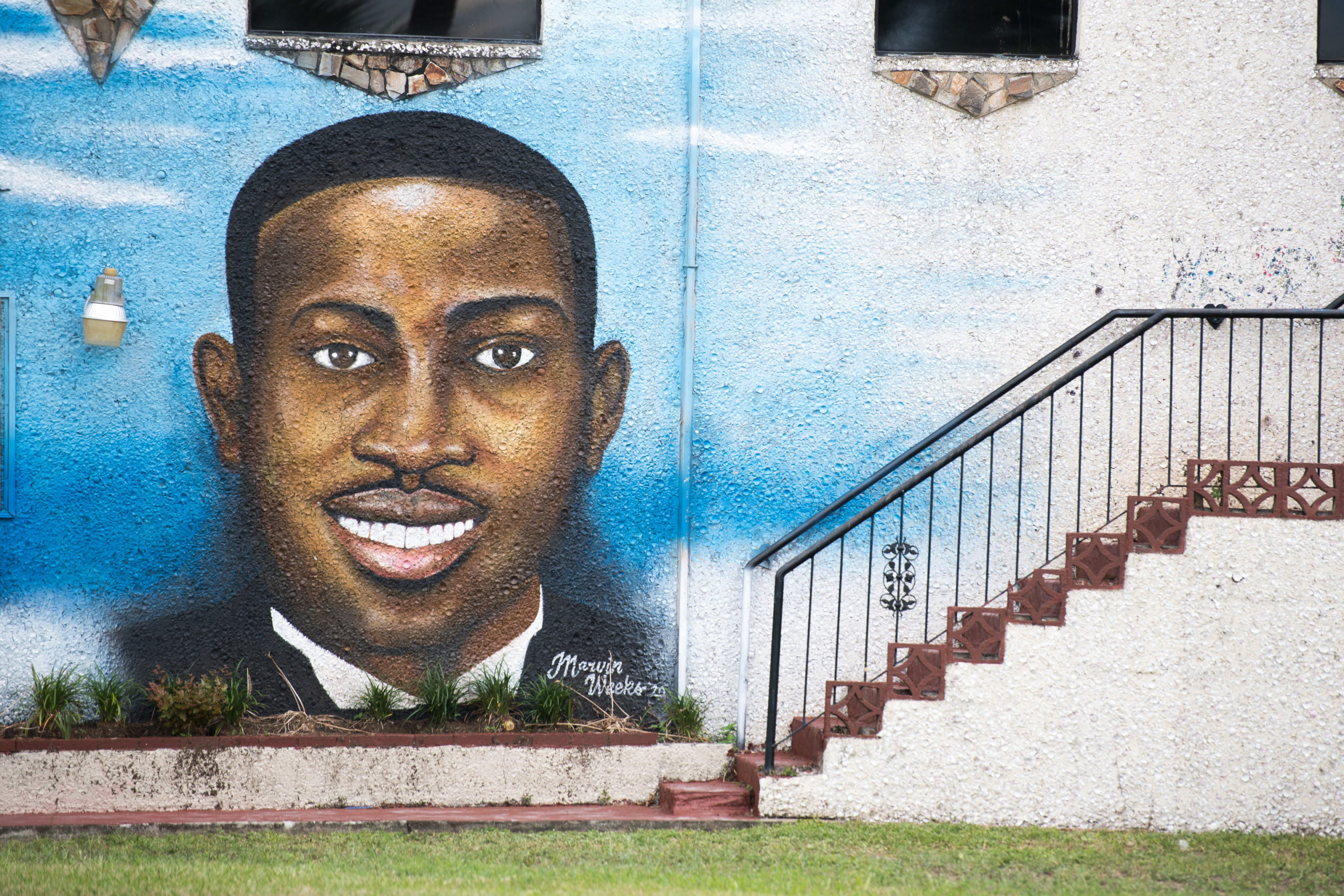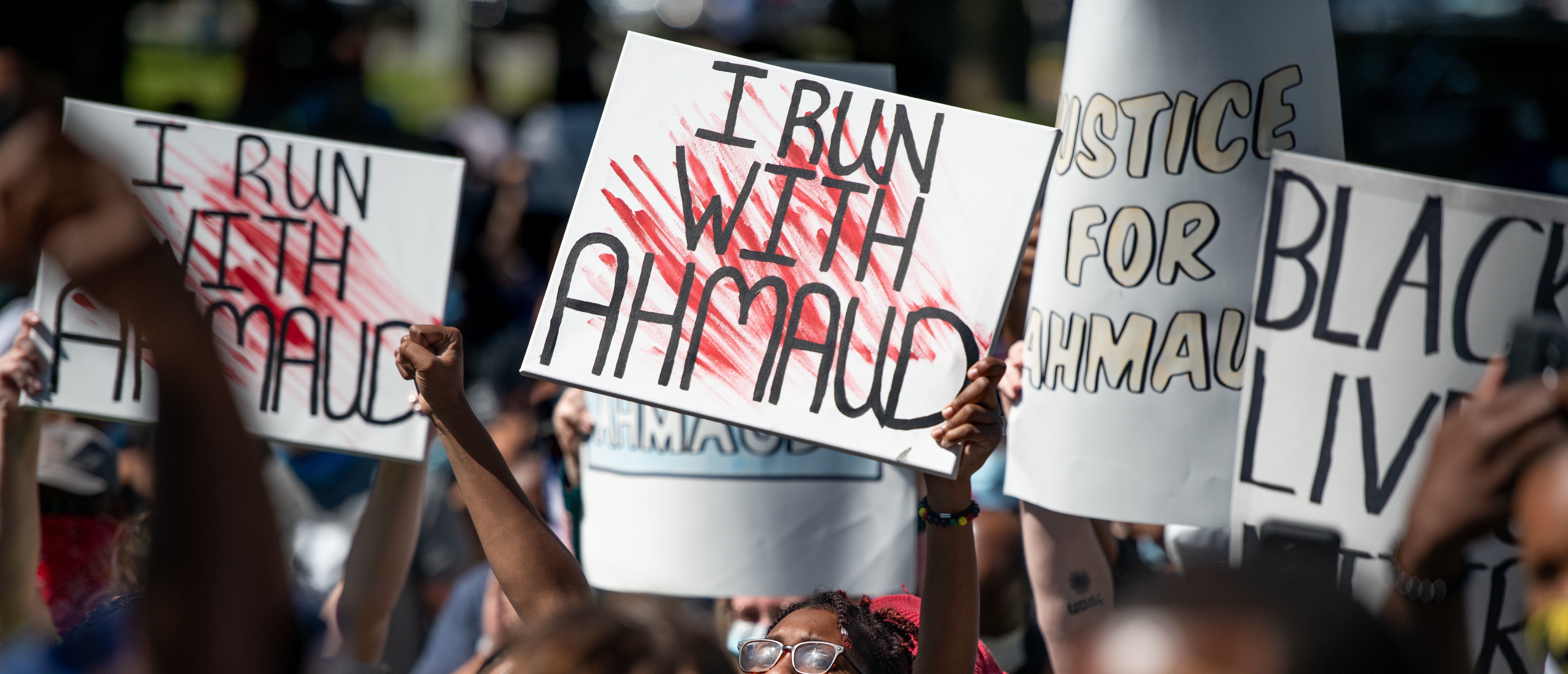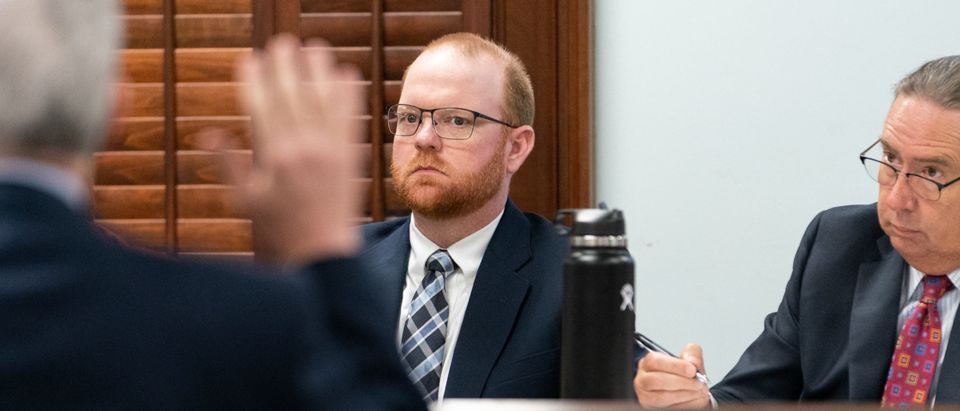- Gregory McMichael, his son Travis and their neighbor, William Bryan, are currently on trial for the murder of Ahmaud Arbery, a 25-year-old black man, who was shot and killed near his home in Brunswick, Georgia, in February 2020.
- In his opening statement Travis McMichael’s lawyer, Robert Rubin, argued that his client was acting in defense of his neighborhood, believing Arbery to be a burglar and attempting to carry out a citizen’s arrest.
- The lead prosecutor on the case, Linda Dunikoski, argued that the men had no evidence to suggest Arbery was committing a crime and were not justified in their pursuit of him.
- Surveillance video shown to the jury depicted Arbery visiting an unfinished house several times in late 2019. The owner of the house, Larry English, testified that he was not aware of any goods or materials being taken from the house.
The trial of three men accused of murdering Ahmaud Arbery, whose death contributed to unrest during the summer of 2020, is nearing a verdict.
Gregory McMichael, his son Travis and their neighbor, William Bryan, are currently on trial for the murder of Arbery, a 25-year-old black man, who was shot and killed near his home in Brunswick, Georgia, in February 2020. The three men all face the possibility of serving a life sentence in prison without parole.
The events leading up to Arbery’s death were captured in a viral video that depicts the McMichaels chasing down Arbery in a vehicle in their suburban neighborhood. The McMichaels’ neighbor, Bryan, also chased Arbery in another vehicle for several minutes. (RELATED: Facebook Not Showing Search Results For ‘Kyle Rittenhouse’)
In his opening statement, Travis McMichael’s lawyer, Robert Rubin, argued that his client was acting in defense of his neighborhood, believing Arbery to be a burglar and attempting to carry out a citizen’s arrest. Rubin argued that McMichael acted in self-defense when he shot Arbery following a confrontation in which the two men struggled over McMichael’s firearm.

A mural depicting Ahmaud Arbery on July 17, 2020 in Brunswick, Georgia. Gregory McMichael, Travis McMichael, and William ‘Roddie’ Bryan appeared before a judge for the murder of Ahmaud Arbery. (Photo by Sean Rayford/Getty Images)
“It’s tragic that Ahmaud Arbery lost his life,” Rubin said. “But at that point, Travis McMichael is acting in self-defense. He did not want to encounter Ahmaud Arbery physically. He was only trying to stop him for the police.”
Linda Dunikoski, the lead prosecutor on the case, argued that the defendants had no evidence to suggest Arbery was committing a crime and were not justified in their pursuit of him. She accused the men of making assumptions regarding Arbery’s behavior that led to his death.
“All three of these defendants did everything they did based on assumptions,” Dunikoski said, suggesting that Arbery’s presence was innocuous and that he was merely jogging through the neighborhood. “And they made decisions in their driveways based on those assumptions that took a young man’s life. And that’s why we’re here.”
In response, Rubin contended that the men had reason to suspect Arbery was committing a felony, and under Georgia law, they were legally allowed to pursue a citizen’s arrest. Arbery entered an unfinished house shortly before the men gave chase, and Rubin argued that the McMichaels and Bryan were justified in pursuing him in light of previous burglaries in the neighborhood.

Demonstrators protest the shooting death of Ahmaud Arbery at the Glynn County Courthouse on May 8, 2020 in Brunswick, Georgia. Gregory McMichael and Travis McMichael were arrested the previous night and charged with murder. (Photo by Sean Rayford/Getty Images)
The issue of race is central to the trial. At one point, Bryan’s lawyer, Kevin Gough, asked the judge to remove Rev. Al Sharpton from the courtroom, claiming he did not want “any more black pastors” after Sharpton said with Arbery’s family.
“If we’re going to start a precedent where we’re going to bring high-profile members of the African-American community into the courtroom to sit with the family during the trial in the presence of the jury, I believe that’s intimidating and it’s an attempt to pressure,” Gough said. “It could be consciously or unconsciously an attempt to pressure or influence the jury.”
Dunikoski insinuated that the McMichaels’ feelings about race impacted their assumptions regarding Arbery’s behavior. (RELATED: ‘He’s Not A White Supremacist’: Kyle Rittenhouse’s Mother Says Joe Biden ‘Defamed’ Her Son)
“All of this, and what does he say his emergency is?” Dunikoski said to the jury in her opening statement. “‘I’m out here in Satilla Shores, and there’s a black male running down the street.’ That’s the emergency.”
Surveillance video shown to the jury depicted Arbery visiting an unfinished house several times in late 2019. The owner of the house, Larry English, testified that he was not aware of any goods or materials being taken from the house.
Glynn County Police Officer Robert Rash testified Friday that he would have given Arbery a warning for trespassing and repeatedly entering the unfinished house.
“Once we make contact with the person on the property, we explain to them the homeowner does not want them there, they have no legal reason to be there,” Rash said.
The trial is set to continue next week.
All content created by the Daily Caller News Foundation, an independent and nonpartisan newswire service, is available without charge to any legitimate news publisher that can provide a large audience. All republished articles must include our logo, our reporter’s byline and their DCNF affiliation. For any questions about our guidelines or partnering with us, please contact licensing@dailycallernewsfoundation.org.












